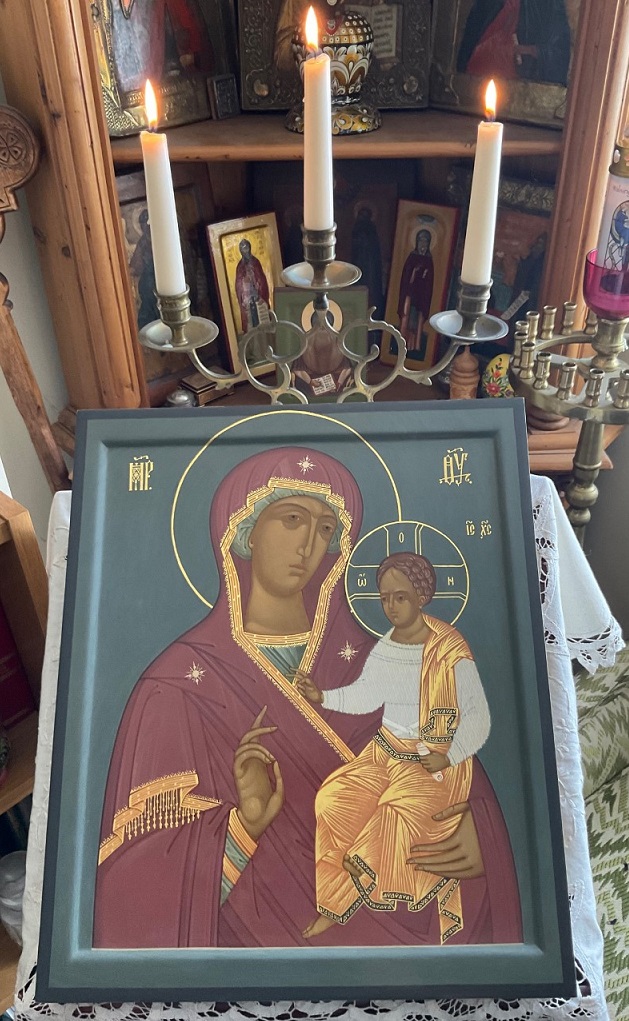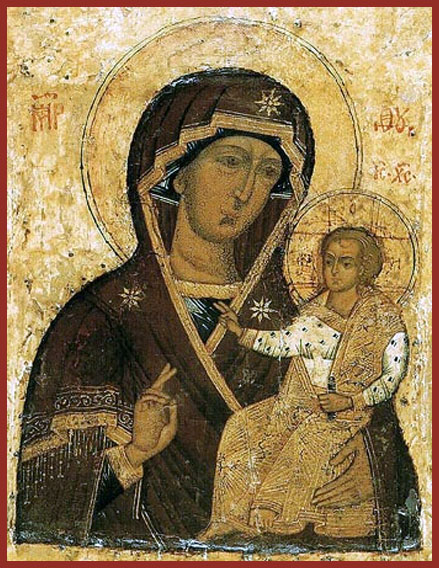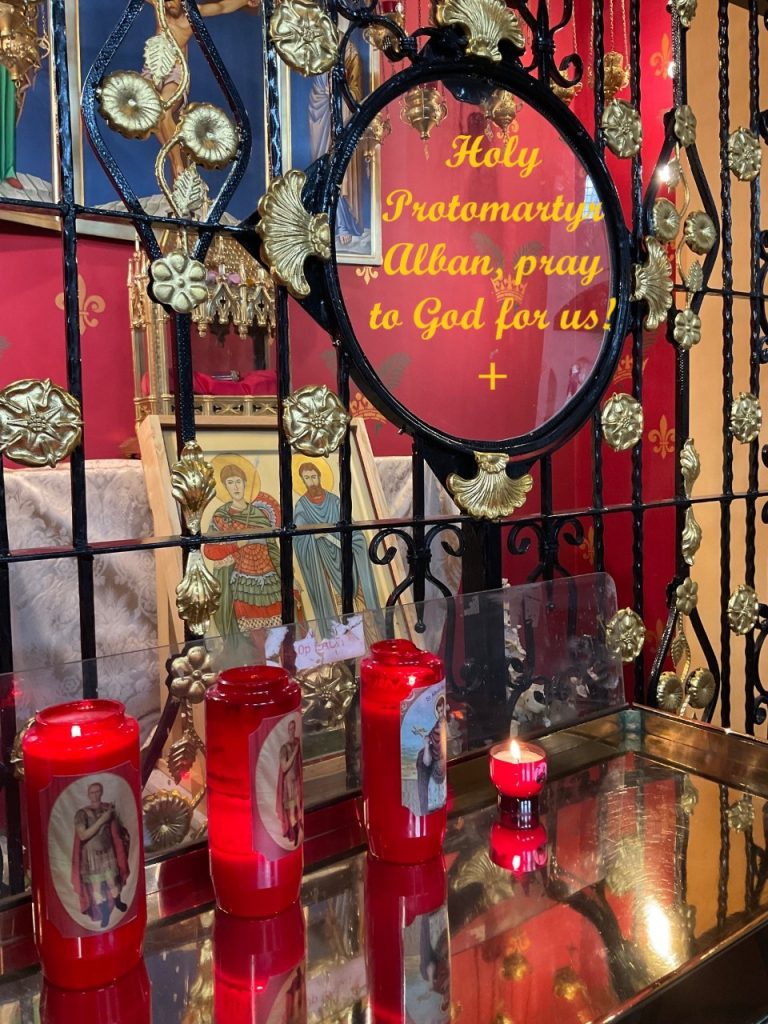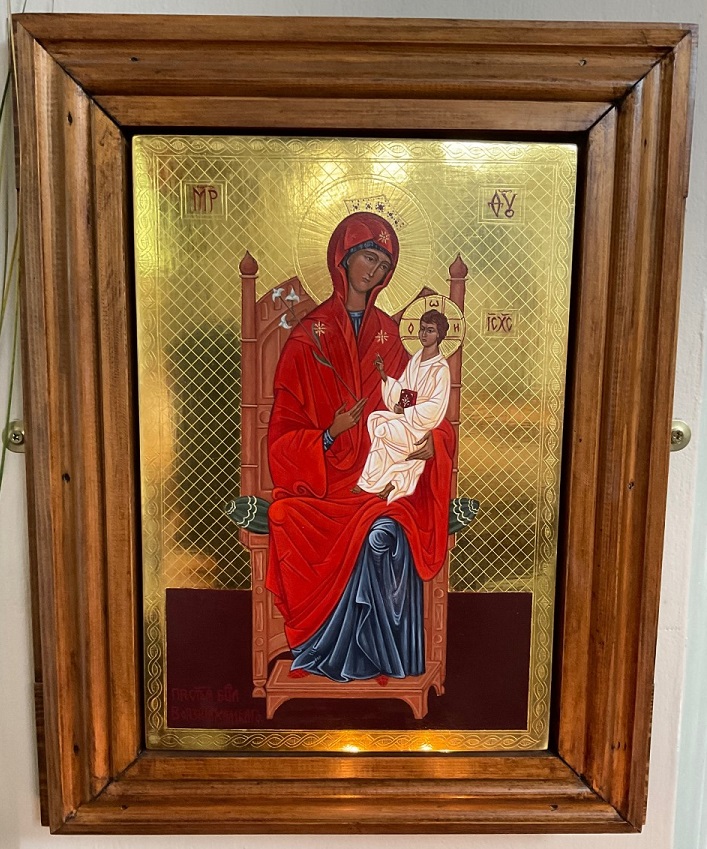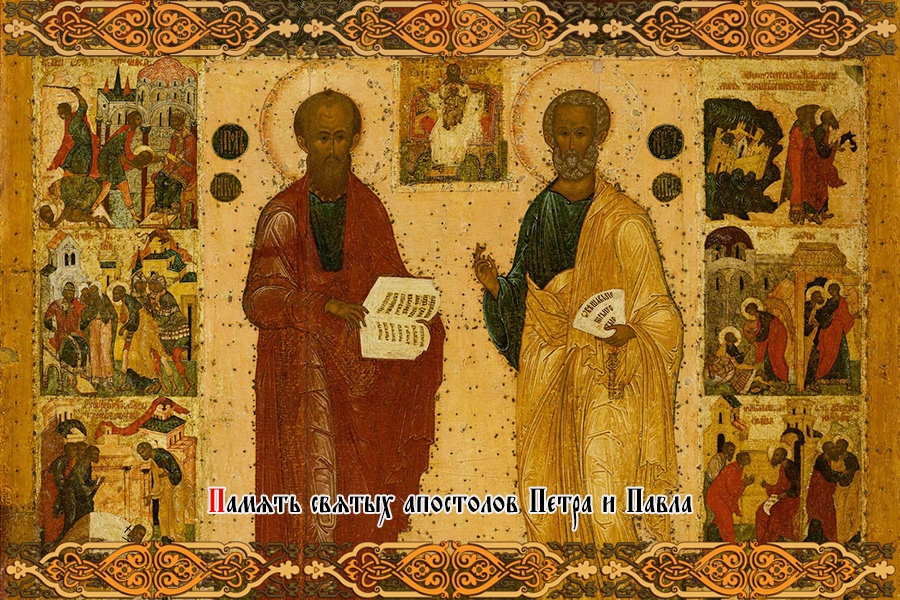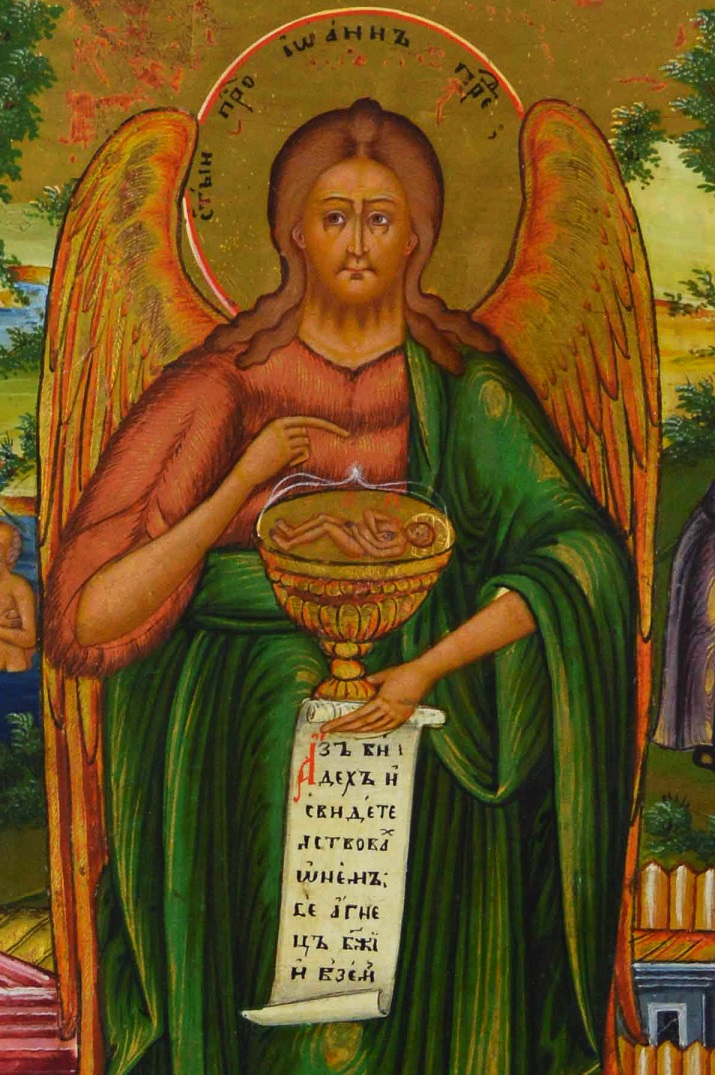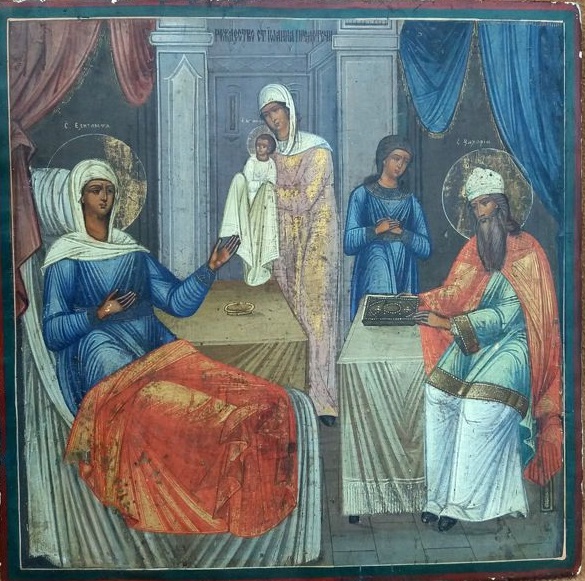Dear brothers and sisters, greetings as we celebrate the feast of the Nativity of St John the Forerunner, sending nameday congratulations to the many Johns named for the Baptist of the Lord – especially our starosta, Norman John. May God grant them all many, blessed years.
Canon I, of John the Monk, with 8 Troparia, including its Irmos, in Tone IV:
Ode I, Irmos: O Thou who wast born of the Virgin, * drown I implore Thee, in the depth of dispassion * the triune nature of my soul, * as Thou didst the mighty strongholds of the warriors, * that in the mortality of my flesh * as on a timbrel * I may chant a hymn of victory.
Holy Prophet, Forerunner and Baptist, John, pray to God for us.
The offspring of the barren woman manifestly proclaimeth the birthgiving of the Virgin, preceding the Sun like a magnificent dawn. And he now shineth forth the light of piety and grace upon the whole universe.
Holy Prophet, Forerunner and Baptist, John, pray to God for us.
“Truly art thou called the prophet of the Most High; for thou goest before the face of Christ, to prepare the way for the Creator!” Zacharias cried out to thee, his son, borne up by the most Holy Spirit, O most praised John.
Holy Prophet, Forerunner and Baptist, John, pray to God for us.
Hearing the words of Gabriel’s divine news, Zacharias showed himself to be intractable, and was stricken with muteness; but he is suddenly loosed therefrom, for John the Forerunner, the voice of the Word, hath been born.
Most Holy Theotokos, save us.
O most immaculate Theotokos, thou godly city of the King of all, habitation well-pleasing unto God, precious treasure: preserve thine inheritance, which ever praiseth thee and honoureth thy birthgiving with faith.
Another Canon, of Andrew, with 6 Troparia, in Tone IV:
Irmos: Let us chant unto God our Redeemer, * Who of old guided Israel * fleeing from the slavery of Pharaoh, * and fed them in the wilderness, * for He hath been glorified.
Holy Prophet, Forerunner and Baptist, John, pray to God for us.
The silence of the father is a symbol of the mysteries of the Scriptures of the law; for when grace arrived Moses fell silent. For it was fitting that all fall silent in the presence of the treasure of wisdom which had been revealed.
Holy Prophet, Forerunner and Baptist, John, pray to God for us.
While the priest was censing in the temple, an angel from on high stood before him and cried aloud: “I am come unto thee bearing news of a strange birthgiving, O elder! For thou shalt receive from the barren woman the baptizer of Christ as your offspring.”
Holy Prophet, Forerunner and Baptist, John, pray to God for us.
“Wherefore dost thou marvel, O elder? Why standest thou, refusing to believe the one who telleth thee these things? For he is an angel, even if he is in the semblance of a man, be thou therefore mute until the time of the birth of the voice of the Word!”
Holy Prophet, Forerunner and Baptist, John, pray to God for us.
He who made the silence of Zacharias a symbol of the written law hath thereby shown me to be a preacher of repentance who cry out: He giveth unto the barren woman a son who is the voice who crieth.
Glory be to the Father and to the Son, and to the Holy Spirit.
O the most glorious pronouncements of the Forerunner of Christ! He who, even before he was wrapped in swaddling bands, recognized Him who hath loosed our bonds and sanctified the nations, is born today of Elizabeth and looseth the voice of his father.
Both now and ever, and unto the ages of ages. Amen.
Thou art the habitation of God and the noetic ladder by which God hath descended and, taking our form, hath led our nature up to the heavens. Thee do we all praise as the mediatress of our salvation.
Ode III, Irmos: Not in wisdom, nor in power do we glory, * but we glory in Thee O Christ, * the Hypostatic Wisdom of the Father, * for there is none more holy than Thee, O Lover of mankind.
Holy Prophet, Forerunner and Baptist, John, pray to God for us.
The birthgiving of the Master is accomplished through the Virgin, while that of His beloved servant is through an elderly and barren mother; wherefore, splendidly hath he proceeded the Wonder of wonders.
Holy Prophet, Forerunner and Baptist, John, pray to God for us.
The elderly and barren woman kisseth the Virgin Mother, truly recognizing her birthgiving, for the bond of her barrenness hath been loosed by the will of God.
Most Holy Theotokos, save us.
O thou who hast given birth unto God incarnate without having known wedlock, make me steadfast who am beset by the assaults of the passions; for I have none other helper than thee, O most pure one.
Another Irmos: Having established the thunder * and fashioned the wind: * do Thou make me steadfast O Lord, * that I may hymn Thee in truth and do Thy will; * for none is as holy as Thou, O our God.
Holy Prophet, Forerunner and Baptist, John, pray to God for us.
Elizabeth, who before was barren, prefigured Thy Church of the nations, O Christ, and, giving birth most gloriously, she hath revealed as most fertile that which once was seen to be barren.
Holy Prophet, Forerunner and Baptist, John, pray to God for us.
Making straight the ways of the Lord and preparing His path, O prophet and herald of Christ, thou didst show mankind the fruits of repentance, teaching them the way of life.
Glory be to the Father and to the Son, and to the Holy Spirit.
Dancing today, Elizabeth holdeth thee in her elderly arms, O Forerunner, and crieth out, uttering the praise: None is as holy as Thou, O Lord our God!
Both now and ever, and unto the ages of ages. Amen.
O most holy Theotokos, thou didst loose the grief of our first parents, giving birth to the Creator of life and Redeemer for us. Him do thou earnestly entreat, that thy flock be saved.
Lord, have mercy. Lord, have mercy. Lord, have mercy.
Sessional Hymn, in Tone VIII: Spec. Mel.: “That which was commanded …”: The Forerunner, the voice of the Word, upon his birth splendidly loosed the voice of Zacharias, and he hath shown unto all the barrenness of the law, crying out: Repent, ye who are on earth, for, lo! Jesus cometh and hath appeared, desiring to deliver all from the primal curse, illumining them with baptism! Truly this is a most glorious wonder!
Glory be to the Father and to the Son, and to the Holy Spirit.
Tone IV: Spec. Mel.: “Joseph marvelled …”: Like the radiant sun, the son of Zacharias hath shone forth upon us through the womb of Elizabeth, and loosed the muteness of his father, crying out to all men with great boldness: “Make straight the way of the Lord! For He freeth and saveth those who have recourse unto Him.” Entreat Him Whom didst thou preach, O John, that our souls be saved.
Both now and ever, and unto the ages of ages. Amen.
By thy divine birthgiving, O pure one, * thou hast renewed the mortal nature of those born on earth, * which had become corrupt through the passions, * raising up all from death to a life of incorruption. * Wherefore, as is meet we all bless thee, ** O exceedingly glorious Virgin, as thou didst foretell.
Ode IV, Irmos: He who sitteth in glory upon the throne of the Godhead, * Jesus the true God, * is come in a swift cloud * and with His sinless hands he hath saved those who cry: * Glory to Thy power, O Christ.
Holy Prophet, Forerunner and Baptist, John, pray to God for us.
A mystery hath preceded ineffable mysteries, proclaiming release from suffering by a renewed nature, through its correction and deification, O Christ.
Holy Prophet, Forerunner and Baptist, John, pray to God for us.
Isaiah prophesied that when the Son would become flesh, the Father would say: “Behold, I send before Thy face an earthly angel, the equal of the angels, who crieth out: Glory to Thy power, O Christ!”
Holy Prophet, Forerunner and Baptist, John, pray to God for us.
I have been born to serve the Master as a servant; for, lo! for this reason I have come, to announce His coming, that the barren and elderly woman, putting forth fruit, may believe beforehand the birthgiving of the Virgin.
Most Holy Theotokos, save us.
The womb of the holy Theotokos, in whom it was Thy good pleasure to make Thine abode as in a fragrant dwelling, O supremely divine Word of the Father, was neither corrupted, nor suffered pain; for she gaveth birth to Emmanuel: God and man.
Another Irmos: I have heard of Thy glorious Dispensation, * O Christ our God: * how Thou wast born of the Virgin, * that Thou mightest deliver from error * those who cry aloud to Thee: * Glory to Thy power, O Lord.
Holy Prophet, Forerunner and Baptist, John, pray to God for us.
Repentance was made accessible through thy nativity, O Forerunner and herald; for thou alone didst preach, crying aloud: Repent ye! The kingdom of heaven is at hand!
Holy Prophet, Forerunner and Baptist, John, pray to God for us.
Virginity is established and chastity doth triumph; the desert rejoiceth, and the world holdeth festival in thy nativity, O Forerunner!
Glory be to the Father and to the Son, and to the Holy Spirit.
Elizabeth rejoiceth and Zacharias speaketh once again. Both, therefore, become young in their old age and are rendered luminous through John the voice of the Word.
Both now and ever, and unto the ages of ages. Amen.
Of old, the lawgiver saw thee as the bush unconsumed by the fire, and Daniel envisioned thee as a holy mountain, O Sovereign Lady who alone art Mother and Virgin.
Ode V, Irmos: Now I shall arise said God prophetically, * now I shall be glorified, now I shall be exalted, * elevating fallen human nature, * which I received from the Virgin, * to the noetic light of My divinity.
Holy Prophet, Forerunner and Baptist, John, pray to God for us.
The earth hath given rise to the true herald, the voice who preacheth to all, with the tongue of the Spirit, the Son of the Virgin, righteousness from heaven which hath come down to us in a bodily substance.
Holy Prophet, Forerunner and Baptist, John, pray to God for us.
The Lord hath appointed thee the true luminary of Christ, enlightening all, clothing only those who are His enemies in shame, as in a garment, and forthrightly proclaiming the Word and Son of God.
Holy Prophet, Forerunner and Baptist, John, pray to God for us.
All creation rejoiceth in thy nativity in a godly manner; for thou wast shown to be an earthly angel and a heavenly man, O Forerunner, proclaiming the God of heaven Who assumed flesh for our sake.
Most Holy Theotokos, save us.
He Who is begotten of the Father hath been born of thee and is ever with thee: the ever-existing and indivisible Word, the only-begotten Son, Who, in the latter days, became incarnate of the Virgin and the Holy Spirit.
Another Irmos: Shine upon me, O Lord, * the light of Thy commandments, * for my soul riseth early to Thee and hymneth Thee: * For Thou art our God, * and unto Thee do I flee, O King of peace.
Holy Prophet, Forerunner and Baptist, John, pray to God for us.
O Sun of righteousness, Thou hast prepared a star, Thy baptizer John, who today is born according to Thy promise and hath loosed the voice of his father.
Holy Prophet, Forerunner and Baptist, John, pray to God for us.
Utter thou no words of protest, O sacred elder; for Gabriel, the foremost among the archangels, telleth thee the mysteries of God, telling all of His descent unto us.
Holy Prophet, Forerunner and Baptist, John, pray to God for us.
Be not unbelieving, O elder; for God hath promised that thou shalt beget a son in thine old age, in whose birth many shall rejoice, for he shall come with the power of Elijah.
Glory be to the Father and to the Son, and to the Holy Spirit.
O prophet, herald and forerunner, offspring of the barren woman, preacher of repentance, lamb of the wilderness, and lampstand of the Light: pray thou for all with faith who honour thee
Both now and ever, and unto the ages of ages. Amen.
We hymn thee, O Sovereign Lady, Mother of the Creator of all, as the impassable portal, the bush unconsumed, and the unquarried mountain from whom was cut the Stone Who is He Who assumed flesh from thee.
Ode VI, Irmos: I have reached the depths of the sea * and the tempest of my many sins hath engulfed me; * but do Thou raise up my life from the abyss * O Greatly-merciful One.
Holy Prophet, Forerunner and Baptist, John, pray to God for us.
While yet in thy mother’s womb, as a prophet thou didst recognize the Word of God, and, deified by the unapproachable light, thou didst utter theology in that dark chamber, employing her tongue.
Holy Prophet, Forerunner and Baptist, John, pray to God for us.
As the voice of one crying unceasingly, O Baptist, cease thou never to entreat the Redeemer of the world, that He loose the spiritual barrenness of those who hymn thy nativity.
Most Holy Theotokos, save us.
Thy womb, O pure Theotokos, was revealed to be the dwelling-place of the unapproachable Godhead, upon Whom the heavenly ranks cannot gaze without fear.
Another Irmos: The tempest of evil thoughts, hath overwhelmed me, * dragging me down into the abyss of my numberless sins; * but, going before me, O good Helmsman, * govern me as Thou didst the Prophet, * and save me.
Holy Prophet, Forerunner and Baptist, John, pray to God for us.
Today John is born: the citizen of the desert, the preacher of repentance, the true witness of grace, the forerunner of the Word, the star which shineth before the Light.
Holy Prophet, Forerunner and Baptist, John, pray to God for us.
Today, the axe which hath been forged, hath portended the hewing of barren souls, and planting the fruits of the virtues, hath surely come forth in thy nativity, O forerunner.
Holy Prophet, Forerunner and Baptist, John, pray to God for us.
Jordan hath rejoiced most gloriously and leapeth up, learning that John is born of the barren one’s womb; wherefore the sea danceth with leaping waters.
Glory be to the Father and to the Son, and to the Holy Spirit.
Coming forth, the candle-stand of the Light preached the coming of the Saviour, the Lamb of God, Who hath shone forth light upon the earth, offered spiritually for all nature.
Both now and ever, and unto the ages of ages. Amen.
O all-immaculate Birthgiver of God, who hast given birth to the Abyss of mercy: drowning the abyss of my passions in the depths of thy compassions, grant me a torrent of tears from my soul.
Lord, have mercy. Lord, have mercy. Lord, have mercy.
Glory be to the Father and to the Son, and to the Holy Spirit; both now and ever, and unto the ages of ages. Amen.
Kontakion, in Tone III: Spec. Mel.: “Today the Virgin …”: Today she who before was barren * giveth birth unto the forerunner of Christ, * he is the fulfilment of all prophecy; * for, laying his hand in the Jordan upon Him * Whom the prophets foretold, * he hath been shown to be the prophet, herald and forerunner ** of the Word of God.
Ikos: Let us now praise the forerunner of the Lord, to whom Elizabeth gaveth birth for the priest, by means of her barren womb, though not seedlessly; for Christ alone passed through an inviolate dwelling without seed. The barren woman gaveth birth unto John, but did not beget him without the aid of her husband; but the pure virgin gaveth birth to Jesus through the overshadowing of the Father and the Spirit of God. The prophet, herald and forerunner was revealed through the barren woman to the Seedless One.
Ode VII, Irmos: The three youths in Babylon, * regarded the tyrant’s command as foolishness, * and cried aloud in the midst of the flame: * Blessed art Thou, O Lord God of our fathers!
Holy Prophet, Forerunner and Baptist, John, pray to God for us.
Before, all of human nature was in darkness, O forerunner; but thou wast shown to be the dawn, crying out: Blessed art Thou, O Lord God of our fathers!
Holy Prophet, Forerunner and Baptist, John, pray to God for us.
Thy nativity through the barren woman hath healed all afflicted nature, O forerunner, teaching it to chant: Blessed art Thou, O Lord God of our fathers!
Holy Prophet, Forerunner and Baptist, John, pray to God for us.
Thy nativity through the barren woman hath healed all afflicted nature, O forerunner, teaching it to chant: Blessed art Thou, O Lord God of our fathers!
Most Holy Theotokos, save us.
O blessed Virgin, pray for us who beseech thee; for on thee do we set our hope, and to thee do we cry aloud: O Sovereign Lady, disdain not thy servants!
Another Irmos: In the Persian furnace the youths and descendants of Abraham, * burning with a love of piety * rather than by a flame of fire, * cried aloud saying: * Blessed art Thou in the temple of Thy glory, O Lord.
Holy Prophet, Forerunner and Baptist, John, pray to God for us.
Falling mute for a time, Zacharias made plain his silence by writing; and, provided again with speech through thy nativity, O forerunner, he most gloriously announced the grace of the Spirit.
Holy Prophet, Forerunner and Baptist, John, pray to God for us.
The most honoured Elizabeth, that barren and childless woman, is like unto the Church: which before was bedimmed with sacrifices and ordure now boasteth in beauty and birthgiving.
Holy Prophet, Forerunner and Baptist, John, pray to God for us.
Today the spiritual axe, whereby all the uprisings of the passions are hewn down, is honed by the nativity of the forerunner; and the fruits of repentance mystically flourish.
Holy Prophet, Forerunner and Baptist, John, pray to God for us.
We honour thee, O John, as the mediator between the old and the new testaments, the one who maketh straight the paths of Christ Who cleanseth the threshing-floor of transgression with the winnowing-fan of the Spirit.
Glory be to the Father and to the Son, and to the Holy Spirit.
We all hymn the glorious John who issued forth from the barren woman, the forerunner and preacher of repentance, who hastened like a star before the Sun, Christ our God.
Both now and ever, and unto the ages of ages. Amen.
O Virgin Theotokos, cease thou never to pray on behalf of all unto Him Who, without seed, made His abode within thy womb, Who, in His ineffable and utter humility, was born and beggared Himself for our sake.
Ode VIII Irmos: O almighty Redeemer of all, * having descended and bedewed the children * in the midst of the flame, * Thou didst teach them to sing: * All ye works bless and hymn the Lord.
Holy Prophet, Forerunner and Baptist, John, pray to God for us.
Moses the lawgiver was a servant, but Jesus is the God of the new covenant; and now the forerunner hymneth both, as mediator between them, saying: Bless the Lord, all ye works of the Lord!
Holy Prophet, Forerunner and Baptist, John, pray to God for us.
A turtle-dove hath issued forth from the womb of the barren one! Like a divinely planted grove she hath offered the forerunner of Christ unto the Church, chanting: All ye works of the Lord, bless ye the Lord!
Holy Prophet, Forerunner and Baptist, John, pray to God for us.
O God-bearing people, holy nation, liken yourselves unto the turtle-dove of Christ and, abiding in chastity, chant ye with voices flowing with honey: All ye works of the Lord, bless ye the Lord!
Most Holy Trinity, our God, glory to Thee.
Illumined with the threefold Light, let us worship the one uncreated Godhead, ceaselessly crying aloud in an Orthodox manner: All ye works of the Lord, bless ye the Lord!
Another Irmos: In wisdom hast Thou fashioned all things, O Master, * Thou didst establish the earth firmly upon the fathomless depths of the waters, * in accordance with Thy knowledge, * wherefore we hymn Thee chanting: * Unceasingly bless ye the Lord all ye works of the Lord.
Holy Prophet, Forerunner and Baptist, John, pray to God for us.
Before thy birth, before thine own swaddling-clothes, O forerunner, thou didst recognize Christ, the Bestower of life, Whom thou didst worship, pointing Him out by leaping, and naming Him thy Lord, by borrowing thy mother’s tongue, and singing unto Christ our God.
Holy Prophet, Forerunner and Baptist, John, pray to God for us.
The ends of the earth celebrate the forefeast today; the angels and the souls of the righteous rejoice; the quick and the dead are gladdened by the birth of John, receiving through him the preaching of the Saviour and Lord of all.
Holy Prophet, Forerunner and Baptist, John, pray to God for us.
Today the Jordan, likening itself to John, hath leapt up most gloriously in its fluid torrents, listening to him whose life is like unto that of the angels, who was born of a barren and elderly woman, who maketh straight the ways and paths of the Lord and hath baptized the world.
Glory be to the Father and to the Son, and to the Holy Spirit.
Today Zacharias noted on a slate the name of the prophet and forerunner which was designated by God, and in his silence he declared: Let him be called John who is born to me in mine old age! This marvellous designation befitteth one who was begotten according to God’s promise.
Both now and ever, and unto the ages of ages. Amen.
Thy people, O Virgin, have thee as a mighty consolation, a hope unashamed, an unassailable rampart and divine intercession, and, saved, they glorify and cry out to thee earnestly: Bless the Lord unceasingly, all ye works of the Lord!
Ode IX, Irmos: The ineffable hidden mystery of God hath been revealed in thee, * O most pure Virgin; * for in His tender compassion * God become incarnate of thee. * Wherefore, we magnify thee as the Theotokos.
Holy Prophet, Forerunner and Baptist, John, pray to God for us.
Lo! the voice of the forerunner falleth upon barren and empty hearts, crying: Prepare ye now the way of Christ, for He shall come in glory, and, submitting ourselves, we magnify Him!
Holy Prophet, Forerunner and Baptist, John, pray to God for us.
As of old, O forerunner, thou didst through the Holy Spirit manifestly preach the Son, Who is the Lamb of God Who taketh away the sins of the world, ask thou forgiveness of sins for thy flock.
Most Holy Trinity, our God, glory to Thee.
Chanting in an Orthodox manner, O ye faithful, let us glorify the threefold Unity, the consubstantial Trinity, Who illumineth us divinely and filleth our souls with the splendors of the never-waning light.
Most Holy Theotokos, save us.
O thou who hast dominion over all creatures, grant the trophy of victory to thy people and set the feet of Orthodox hierarchs upon all heresies and schisms, that we may magnify thee as the Theotokos.
Another Irmos: For the Mighty One hath done great things to me, * and holy is His name; * and His mercy is upon them that fear Him * unto generation and generation
Holy Prophet, Forerunner and Baptist, John, pray to God for us.
Behold, in thee, O priest, hath God wrought a great and most glorious sign; for thou hast begotten a son, the forerunner, in thine old age and in the mortality of thy flesh.
Holy Prophet, Forerunner and Baptist, John, pray to God for us.
Let barren women hearken and chant unto God! For, lo! Elizabeth crieth out: I give birth unto a son of mine old age and in the mortality of my flesh!
Holy Prophet, Forerunner and Baptist, John, pray to God for us.
Be glad and rejoice now in God, O Zacharias! For, lo! Elizabeth nourisheth the son of her old age at her breast and in the mortality of her flesh giveth birth to the forerunner.
Glory be to the Father and to the Son, and to the Holy Spirit.
Glory to Him Who hath giveth fruit to the barren woman in her old age and hath bestowed upon the aged prophet a son, the divine forerunner, who prepareth for Him a perfected people.
Both now and ever, and unto the ages of ages. Amen.
He Who was begotten in the bosom of the Father without passion and corruption, having made His abode within thee, in His loving-kindness hath led us to the Father and the divine Spirit.
Troparion, Tone IV: O prophet and forerunner of the coming of Christ, * we who honour thee with love * are at a loss how to worthily praise thee; * for by thy glorious and honoured nativity * thou didst loose the barrenness of her who gave birth to thee * and the muteness of thy father, ** and proclaimed to the world the incarnation of the Son of God.


